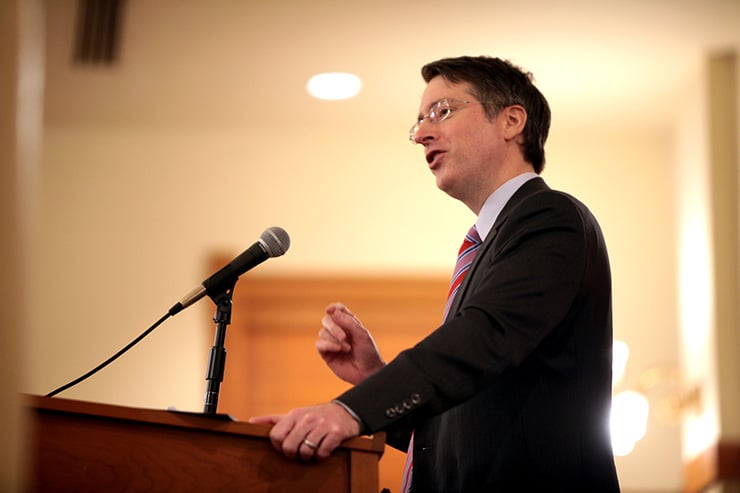It seems that Rich Lowry, editor-in-chief of National Review, has been canceled from two speaking engagements. One was at Indiana State University and the other at the Badger Institute, which Lowry describes as “a right-of-center institute in Wisconsin.” This was in response to Lowry appearance on the Megyn Kelly Show where, apparently, he committed a disastrous speaking error when explaining the Haitian migrant problem in Springfield, Ohio.
From Lowry’s account, it would seem that he slurred the word “migrant” in pronouncing the phrase “Haitian migrants,” and it sounded to his listeners that he was engaging in a racial insult. Retribution immediately fell on the speaker, who was suddenly disinvited by his prospective hosts, who, according to Lowry, proved that “cowardice is contagious.” But Lowry, who is apparently fighting for both his honor and against censorship, won’t take this rebuff lying down. He has enlisted his magazine to defend him against an unfair charge; and he has had contributors, like John McWhorter, testify to the fact that he never said, “what he appeared to say.” Lowry has also stressed the difficulty of exonerating himself since “the denial of a completely fabricated charge implies a sort of guilt.”
I suspect that what Lowry is telling us is correct, since I have never encountered anyone who works as hard as Lowry at sounding politically correct. That includes all the space he’s devoted to declaiming against the evil or buffoonery of Donald Trump, presumably to keep his NeverTrump donors behind him. Unfortunately, I find it emotionally impossible to feel the slightest sympathy for his cause, just as I would be totally indifferent to the fate of a Mafia capo who had money stolen from his car. It is hard to think of an enterprise that has done less for open discussion on the right than National Review, particularly under Lowry’s stewardship.
One might have thought that Lowry would continue to enjoy the good will of the New Yorker, Forbes, the Guardian and Southern Poverty Law Center, all of which in April 2012 cheered his decision to sack that supposed white nationalist John Derbyshire. John had written a commentary stating that he’d discourage his children from stopping on the road to assist black youths who apparently were waving down help for their disabled auto. Derbyshire argued at Taki Magazine that the risks his children might incur from this random act of kindness would outweigh the benefits it might bring to others.
One may disagree with Derbyshire’s measured argument, which reflected his calculating disposition as a mathematician. But what was an indefensible act of “cowardice” is to have thrown poor John to leftist wolves. Not only did Lowry inflict this cruelty on his magazine’s best writer—to whom he had been paying a pittance—he also showed the very pusillanimity that he is now attributing to Indiana State University and to the very obscure Badger Institute.
In this case, what went around did come around. By the way, I was struck throughout John’s ordeal by the odious posturing engaged in by his leftist and neoconservative defamers. I doubt any of them would have stopped in that potentially dangerous situation that John described. I also suspect these politically correct scribblers live in perpetually protected quarters in which they’re shielded from the inner-city residents they glorify.
National Review has never distinguished itself as a paragon of open discussion. Soon after its founding in 1955, its editor, William F. Buckley, Jr., began excommunicating those on the libertarian right who did not support his very aggressive approach to dealing with the Soviet Communist menace. Contrary to Buckley’s later misrepresentations, the targets of his early attacks were not neo-Nazis but Jewish libertarians. This choice of targets for anathematization changed in the 1980s, as Buckley fell under neoconservative influence. Thereafter his magazine turned to banning writers who offended “Norm and Midge” (Commentary Editor Norman Podhoretz and his wife, Midge Decter).
Lowry was appointed to replace National Review’s more independent-minded editor, John O’Sullivan, in 1997. By then, O’Sullivan had taken the magazine in a critical direction on immigration that rattled the Podhoretzes and other neocon dinner companions of the Buckleys. Lowry could be counted on not to give offense to those who counted as neocon celebrities. Traditional conservatives, particularly Southern ones, were no longer welcome as magazine contributors.
In 2003, Lowry got his pal David Frum, then a Bush Republican, to prepare a diatribe for the magazine on “The Unpatriotic Right,” which attacked, among others, Chronicles’ editor and contributors. In this invective, Frum, now senior editor at The Atlantic, denounced and belittled those on the right who failed to endorse Bush’s war of choice against Iraq. Although this military adventure turned out badly, we may assume that Lowry, like Frum, benefited in terms of useful contacts after expressing his support. Soon afterwards, Frum moved leftward, where he has since been joined by other onetime National Review luminaries once showcased by Lowry, including Jonah Goldberg and David French.
We may also recall Lowry’s more recent efforts to distance himself from the Old Right, which is no longer represented in his magazine. Highlighting this effort was his call for the nationwide removal of statues and monuments commemorating Robert E. Lee, someone associated with what Lowry judges to have been a “traitorous” rebellion.
Surveying Rich’s career, I’m experiencing schadenfreude (if you don’t know what that means, then look it up!) at the morally justified turn in his fortunes. And I won’t apologize for feeling as I do.

Leave a Reply